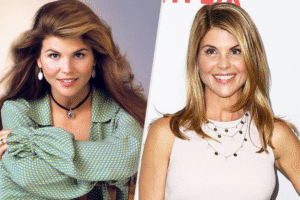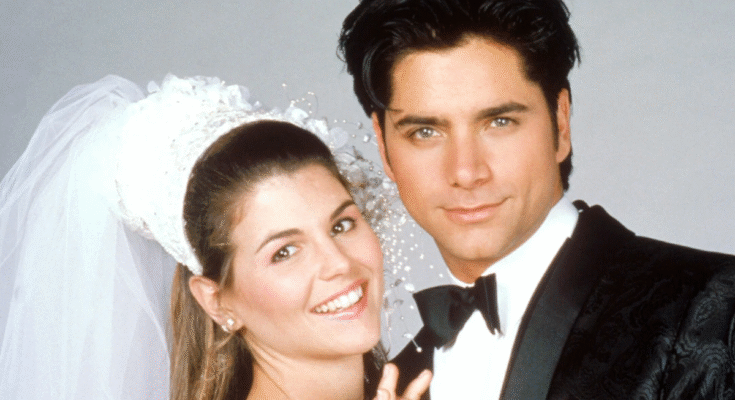How Becky broke television stereotypes to become a blueprint for balanced modern womanhood
Introduction: More Than Just a Perfect Wife
In an era when television wives were often relegated to supporting roles or one-dimensional caregiving, Rebecca “Becky” Katsopolis emerged as something revolutionary: a fully realized woman who refused to choose between professional ambition and family devotion. Portrayed with intelligence and warmth by Lori Loughlin, Becky didn’t just marry into the Tanner family—she redefined what it meant to be a partner, mother, and career woman in the modern world.
Becky’s journey from ambitious television host to devoted wife and mother wasn’t a story of sacrifice or compromise—it was a masterclass in integration, showing audiences that the most fulfilling life comes not from choosing between competing priorities, but from finding ways to honor all aspects of your identity simultaneously. Her character challenged the false dichotomy that had long plagued women’s narratives, proving that strength and tenderness, ambition and nurturing, independence and partnership could all coexist in the same person.
Through her relationship with Jesse Katsopolis and her role in the extended Tanner family, Becky demonstrated that true partnership isn’t about losing yourself in another person—it’s about becoming more yourself through the love and support of someone who sees your full potential and helps you achieve it.
Chapter 1: The Making of a Modern Woman
Professional Foundations
When Becky first appeared on “Wake Up, San Francisco,” she represented something rare in 1980s television: a woman whose professional competence was her defining characteristic rather than her relationship status. As a skilled broadcaster and journalist, Becky brought intelligence, preparation, and genuine expertise to her role, establishing herself as someone who had earned her position through merit rather than appearance or charm alone.
Her approach to her career reflected a deep understanding of professional standards and personal accountability. Becky didn’t just show up—she prepared, she researched, she brought ideas to the table. Her work ethic and professional integrity created a template for how women could establish themselves in competitive fields while maintaining their authenticity and values.
The contrast between Becky’s polished professionalism and Jesse’s initial casual approach to their shared hosting duties created natural tension that drove both character development and audience engagement. Their professional dynamic demonstrated how competence and chemistry could coexist, and how the best partnerships often emerge when different strengths complement each other.
Beyond the Career Woman Stereotype
What set Becky apart from other “career woman” characters of her era was her refusal to embody the cold, calculating stereotype that often accompanied professional ambition on television. She was driven and competent, but also warm, funny, and emotionally available. Her character proved that professional success and emotional intelligence weren’t mutually exclusive qualities.

Becky’s approach to her career also reflected a healthy understanding of boundaries and priorities. She was ambitious but not ruthless, competitive but not destructive. Her professional goals enhanced rather than threatened her personal relationships, demonstrating that success could be achieved without sacrificing integrity or compassion.
Her evolution throughout the series showed how career priorities could shift without representing failure or compromise. As her relationship with Jesse deepened and her family responsibilities grew, Becky found ways to adapt her professional life while maintaining her core identity as a competent, ambitious woman.
Chapter 2: The Art of Partnership
Transforming Jesse Through Love
Becky’s relationship with Jesse Katsopolis represented one of television’s most authentic portrayals of how love can inspire personal growth without requiring fundamental personality changes. Jesse’s transformation from commitment-phobic rock star to devoted husband and father wasn’t the result of Becky trying to change him—it emerged from his desire to become worthy of her love and partnership.
Their courtship demonstrated how healthy relationships develop through mutual respect and gradual trust-building rather than instant chemistry or dramatic gestures. Becky’s patience with Jesse’s initial reluctance to commit, combined with her clear communication about her own needs and expectations, created a template for how couples can navigate different readiness levels for serious commitment.
The evolution of their relationship also showcased how partners can inspire each other’s best qualities. Jesse’s spontaneity and creativity helped Becky embrace more flexibility and fun in her life, while Becky’s stability and vision helped Jesse develop greater emotional maturity and responsibility.
Equality in Action
What made Becky and Jesse’s marriage revolutionary for its time was its fundamental equality. Neither partner was positioned as the leader or the follower—they functioned as genuine teammates who brought different strengths to their shared life. Their decision-making process, conflict resolution, and daily interactions all reflected mutual respect and shared authority.
Their professional collaboration on “Wake Up, San Francisco” provided a public platform for demonstrating how couples could work together without competing or undermining each other. Their on-screen chemistry translated directly from their personal relationship, showing audiences how professional partnerships could strengthen rather than threaten romantic bonds.
The balance they achieved in their marriage—with neither partner sacrificing their core identity for the relationship—offered viewers a model for how modern partnerships could function. They proved that the strongest marriages aren’t built on complementary weaknesses but on combined strengths.
Communication and Compromise

Throughout their relationship, Becky and Jesse demonstrated sophisticated communication skills that set them apart from many television couples. They talked through their differences, expressed their needs clearly, and found creative solutions to conflicts that honored both partners’ perspectives.
Their approach to major life decisions—from marriage to parenthood to career changes—showed how couples could maintain individual agency while building a shared life. Neither partner made unilateral decisions that affected their partnership, and both were willing to adapt their plans when circumstances required flexibility.
Their conflict resolution style emphasized understanding over winning, with both partners working to find solutions that strengthened their relationship rather than simply resolving immediate disagreements. This approach provided viewers with practical examples of how healthy couples navigate inevitable tensions and differences.
Chapter 3: Motherhood Without Martyrdom
Redefining the Mother Role
Becky’s transition into motherhood with twins Nicky and Alex broke new ground in television’s portrayal of working mothers. Rather than presenting motherhood as either a complete identity transformation or a temporary inconvenience, Becky’s experience showed how becoming a parent could expand rather than limit a woman’s sense of herself.
Her approach to motherhood emphasized presence over perfection, showing that good parenting comes from emotional availability and consistent love rather than sacrifice of all personal interests. Becky maintained her professional commitments and personal relationships while also being deeply devoted to her children, proving that mothers could be whole people rather than just caregiving vessels.
The challenges she faced—managing childcare logistics, balancing competing demands, dealing with exhaustion and stress—were portrayed realistically without suggesting that struggling meant failing. Her character normalized the difficulties of modern parenthood while also celebrating its joys and rewards.
Partnership in Parenting
The parenting partnership between Becky and Jesse demonstrated how couples could share childcare responsibilities based on individual strengths rather than traditional gender roles. Both parents were shown as competent caregivers who brought different but equally valuable qualities to their children’s upbringing.
Their different parenting styles—Becky’s structured approach and Jesse’s more playful methods—created a balanced environment for their children rather than conflicting messages. They learned to appreciate and support each other’s approaches while also finding common ground on important issues.
The way they navigated parenting decisions together, from daily routines to major choices about their children’s futures, provided a model for how couples could maintain unity while honoring individual perspectives. Their children benefited from having two fully engaged parents who worked as a team.

Maintaining Individual Identity
Perhaps most importantly, Becky’s journey through motherhood showed that having children doesn’t require erasing yourself. She remained professionally engaged, maintained her friendships, and continued pursuing her own interests while also being a devoted mother. Her character challenged the cultural narrative that good mothers must be completely self-sacrificing.
Her struggles with finding balance were portrayed honestly, acknowledging the real challenges of managing multiple roles without suggesting that the solution was choosing one over the others. Becky’s experience validated the experiences of many women who felt torn between different aspects of their identity.
The support she received from Jesse and the extended Tanner family demonstrated how successful modern motherhood often depends on strong support systems rather than individual heroics. Her willingness to accept help and maintain her other relationships showed that interdependence, not independence, was the key to thriving as a working mother.
Chapter 4: The Fuller House Evolution
Maturity and Wisdom
Becky’s return in Fuller House revealed a woman who had successfully navigated the complexities of midlife while maintaining her essential character. She had grown in wisdom and confidence without losing her warmth, humor, or ambition. Her evolution showed how people could change and mature while remaining fundamentally themselves.
Her role as a grandmother added new dimensions to her character, showing how women could embrace new life stages without being defined or limited by them. Becky’s relationship with her adult children and grandchildren reflected the success of her earlier parenting approach—she had raised confident, independent individuals who still valued family connection.
Her continued professional success and personal fulfillment demonstrated that women’s stories don’t end with marriage and motherhood—they can continue evolving and finding new sources of meaning and accomplishment throughout their lives.
Supporting the Next Generation
In Fuller House, Becky’s relationship with DJ took on new significance as she helped her navigate single motherhood and career challenges. Their dynamic showed how women can support each other across generations, sharing wisdom and experience while respecting individual differences and choices.
Becky’s guidance wasn’t prescriptive or judgmental—she offered perspective and support while allowing DJ to make her own decisions. This approach demonstrated how mentorship could function between women without creating hierarchical or competitive relationships.

Her involvement in the broader family dynamics of Fuller House showed how established family members could adapt to changing circumstances while maintaining their essential supportive role. Becky remained a stabilizing presence who helped hold the family together during transitions and challenges.
Legacy of Balance
Through her continued presence in Fuller House, Becky’s character provided continuity and proof that the balance she had achieved in her earlier life was sustainable and meaningful. Her ongoing happiness and fulfillment validated the choices she had made and the path she had carved out for herself.
Her relationship with Jesse remained strong and dynamic, showing how marriages could continue growing and evolving even after decades together. Their partnership remained characterized by mutual respect, shared humor, and genuine affection—proving that the foundation they had built was truly solid.
The example she set for younger characters and viewers demonstrated that it was possible to build a life that honored multiple aspects of identity and commitment. Her character continued to serve as a blueprint for how women could create fulfilling lives without compromising their core values or relationships.
Chapter 5: Cultural Impact and Lasting Influence
Television Representation Revolution
Becky Katsopolis arrived at a crucial moment in television history when women’s roles were beginning to expand beyond traditional stereotypes. Her character helped usher in a new era of female representation that acknowledged women’s complexity and multi-dimensional nature rather than forcing them into narrow categories.
Her portrayal influenced countless subsequent television characters by proving that audiences would embrace women who were both professionally successful and personally fulfilled. Becky showed that viewers didn’t need to choose between career-focused characters and family-oriented ones—they could have both in the same person.
The authenticity of her character development, particularly the realistic portrayal of work-life balance challenges, helped normalize conversations about women’s experiences that had previously been marginalized or oversimplified in popular media.
Impact on Real Women
For viewers navigating their own attempts to balance career and family, Becky provided a realistic and inspiring example of how such integration might work in practice. Her struggles and successes offered validation for women who were trying to “have it all” without sacrificing their sanity or integrity.

Her relationship with Jesse became a template for many viewers’ understanding of what equitable partnership could look like. Their marriage demonstrated that healthy relationships could enhance rather than constrain individual growth and ambition.
The way Becky handled various life challenges—from professional setbacks to parenting difficulties to family conflicts—provided practical examples of resilience and problem-solving that many viewers applied to their own lives.
Influence on Family Entertainment
Becky’s character helped establish new standards for how family television could portray adult relationships and life challenges. Her presence elevated the show’s ability to address real issues while maintaining its fundamentally optimistic and supportive tone.
Her storylines demonstrated that family entertainment could tackle complex topics like work-life balance, marriage dynamics, and parenting challenges without becoming preachy or losing its entertainment value. This approach influenced many subsequent family shows to embrace more nuanced and realistic portrayals of adult life.
The success of her character proved that audiences were hungry for more sophisticated and authentic representation of women’s experiences, paving the way for more complex female characters in family programming.
Conclusion: The Enduring Power of Authentic Balance
Rebecca Katsopolis’s legacy extends far beyond her role as Jesse’s wife or even as a beloved television character. She represents a turning point in how popular culture portrayed women’s possibilities, proving that the most compelling characters—and the most fulfilling lives—emerge when people refuse to limit themselves to single-dimensional expectations.
Through her journey from ambitious career woman to devoted wife and mother to wise mentor and grandmother, Becky demonstrated that personal evolution doesn’t require abandoning previous aspects of identity. Instead, the richest lives are built by finding ways to integrate and honor all the different facets of who we are and who we want to become.
Her relationship with Jesse showed that the strongest partnerships are built not on traditional role divisions or romantic fantasy, but on mutual respect, shared growth, and the willingness to adapt together as life changes. Their marriage proved that equality and love aren’t just compatible—they’re essential to each other.
Perhaps most importantly, Becky’s character validated the experiences of countless women who refused to accept that they had to choose between professional fulfillment and personal happiness. She showed that with the right support, clear communication, and commitment to both personal growth and relationship health, it was possible to build a life that honored multiple priorities simultaneously.
In a culture that often presents women with false choices and impossible standards, Rebecca Katsopolis stands as proof that authenticity, balance, and integration are not only possible but ultimately more satisfying than any single-minded pursuit. Her story reminds us that the goal isn’t to be perfect in any one role, but to be genuine and committed across all the roles we choose to embrace.
Her enduring appeal lies in her essential humanity—she was never presented as a superhuman figure who made everything look easy, but as a real woman doing her best to build a meaningful life while navigating the same challenges that face anyone trying to balance competing priorities and deep commitments.
Rebecca Katsopolis didn’t just break television stereotypes—she created a new template for how women could envision their own possibilities, proving that the most revolutionary act is often simply refusing to limit yourself to others’ expectations of what your life should look like.
Discover more stories of authentic balance and personal growth at StarConnect Network, where meaningful relationships meet purposeful living.



